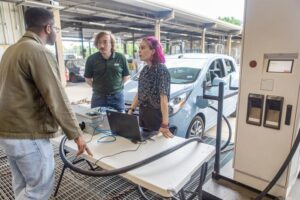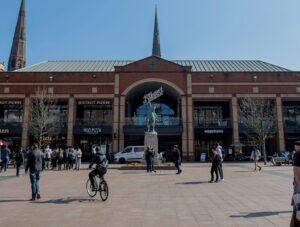London Heatropolis is ‘blueprint’ for future heat networks
Trailblazing Kings Cross heat network supplies heat and power for more than 40 commercial buildings and 2,400 residential units – and shows how decarbonisation could be scaled up across the UK
We’re going to hear much more about ‘heat networks’ over the next year. Such networks use a single supply source to provide heating and power for multiple buildings. It’s thought they’ll comprise more than 18% of heating supply in the UK by 2050.
UK Power Networks’ ‘Heatropolis’ in the Kings Cross area of London is establishing a blueprint for others to follow. Supported by Ofgem’s Strategic Innovation Fund and developed in collaboration with energy management company Passiv and district energy network experts Metropolitan, Heatropolis provides heat and power to premises including Google and Nike’s UK HQs, and a university.
What’s more, Heatropolis has wider reach than this because the idea is to use the project to better understand the options other heat networks across the country could take to more efficiently decarbonise, while also delivering reliable heating and power.
One key element of this is smart management of such networks within the wider energy system. Being able to shift the electric heating load during a given day has the potential to both significantly reduce peak demand and the need to upgrade network infrastructure.
In its initial, ‘discovery’ phase, the Heatropolis project included work to quantify how much innovations in design and control strategies can maximise the use of existing network capacity. That could have major benefits. It’s thought that better understanding how to flexibly operate efficient green heat works could save the equivalent of 1,500 tonnes of CO2, as well as save customers money in bills – perhaps by as much as a total £35m by 2050.
The plan now, in the next phase of the project, is to explore the commercial methods needed to unlock these benefits, while also testing the feasibility of new technologies.
Ian Cameron, Director of Customer Service and Innovation at UK Power Networks, says: ‘There is no “one-size-fits-all” approach to decarbonising heat. Understanding the best approaches to decarbonising heat networks is about creating a series of blueprints that can be implemented on a national scale. Millions of people could benefit from the efficient decarbonisation of heat networks. We want to make sure these networks have every possible opportunity to decarbonise district heating.’
Ian Rose, Sales and Strategy Director at Passiv UK, adds: ‘Passiv UK is excited to collaborate with UK Power Networks and Metropolitan to explore the role that smart control technologies can provide to heat networks in offering more demand flexibility and reducing the need for costly electricity network reinforcement.’
Andrew White, Managing Director at Metropolitan, says: ‘We are delighted to have secured funding for the next stage of this project, which is essential in understanding how heat networks can help reduce grid reinforcement and provide valuable flexibility services whilst lowering carbon emissions from heating homes and businesses.’
In related news:

















Leave a Reply